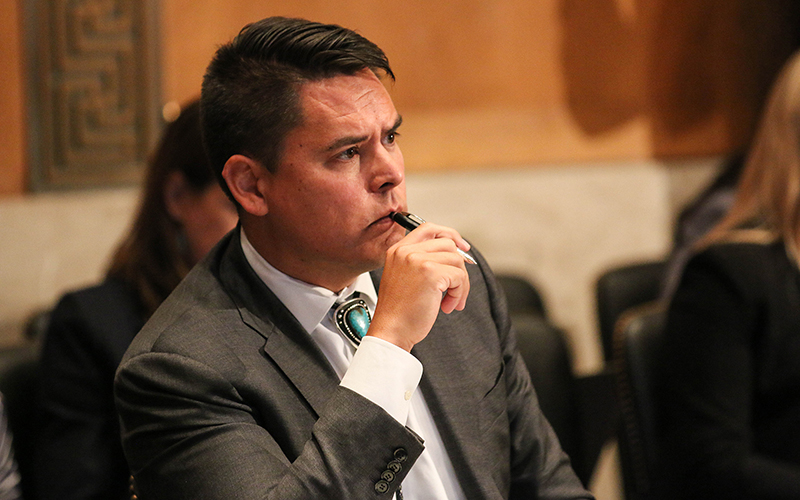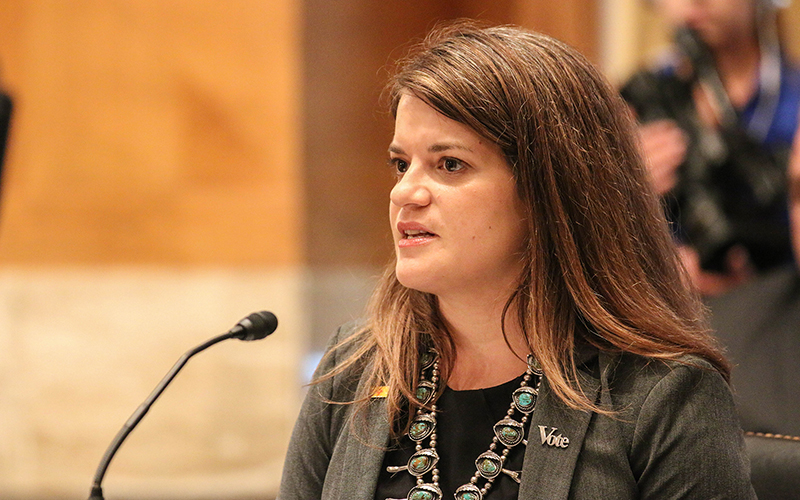
Jackson Brossy, executive director of the Navajo Nation Washington Office, said there are many challenges to Native American voting, including language and remotness of polling places. (Photo by Bryan Pietsch/Cronkite News)

New Mexico Secretary of State Maggie Toulouse Oliver told a Senate roundtable that there are ways, both high-tech and low, to remove barriers and improve rates of tribal voting. (Photo by Bryan Pietsch/Cronkite News)
WASHINGTON – Native Americans have been “systematically denied access to fair representation” as a result of persistent barriers to voting, advocates and tribal leaders told a Senate roundtable Tuesday.
Witnesses told the informal meeting of senators from the Indian Affairs and Rules committees that tribal voters face a range of challenges, from language barriers, to restrictions with mail-in ballots and lack of access to voting locations. Many of those issues are rooted in “blatant discrimination,” one speaker said.
“We should not have to talk about blatant discrimination,” said Jackson Brossy, the executive director of the Navajo Nation Washington Office. “Here we are in 2018. We still face many, many unacceptable barriers to voting for Navajo people.”
Sen. Tom Udall, D-New Mexico, said those barriers represent what he called an “insidious” effort to suppress the Native vote more than 50 years after passage of the Voting Rights Act.
“To this day … many states and local jurisdictions have found new, more insidious ways to impose barriers on Native access to the ballot box,” Udall said, “from voter ID laws to inadequate polling and registration sites, to lack of availability of Native language ballot materials.”
The Navajo Nation was just one of the tribes represented at the hearing, which featured Native American representatives from Alaska to Arizona to Massachusetts. The speakers noted that while every tribe and reservation faces unique challenges, many of the barriers to voting are the same across Indian Country.
Alaska Federation of Natives President Julie Kitka said that Native Americans in Alaska face challenges with language when it comes to understanding ballot initiatives – referendums like marijuana legalization or other proposals.
-Cronkite News video by Dani Coble
“Initiatives are complicated without adequate translation in native languages,” Kitka said. “How can Natives understand what the initiative is?”
Brossy said the language barrier also stops many Navajo people from being able to cast votes, even though it “was addressed” in the Voting Rights Act of 1965.
“Our folks who speak Navajo, but are still taxpayers in the system, should be able to vote,” Brossy said. “Unfortunately, there’s still some work to do in that area.”
New Mexico Secretary of State Maggie Toulouse Oliver said there are a variety of options to provide language assistance without having to send a translator to polling locations, even as some tribes prefer to not have their language written.
Oliver said that even though high-tech options like integrated audio translation in electronic voting machines is available, low-tech solutions like recorded readings of the ballot onto cassette tapes have worked for Navajos in her state.
But Brossy said that Native American voters can face challenges even when it comes to programs that are designed to improve voting access, because of the remoteness of many reservations.
“Expansion (of early voting) has not equally benefited the Navajo Nation,” he said. “In 2016, the Apache County in Arizona only had two early voting locations for Navajo people. So that required our people to drive 95 miles each way to go vote.”
He noted that many homes in the Navajo Nation – which spans 27,000 square miles in Arizona, Utah and New Mexico – lack street addresses and instead use post office boxes, which can slow down or halt the voter registration process. Problems can also arise when tribal identification cards lack an address, or when multiple families share one household and only one ballot is provided.
“We want folks to be able to vote regardless of where they live,” Brossy said. “We want to make sure there are no hiccups in the next election.”
Brossy said that a voter on the Navajo Nation deserves the same access to voting as someone living in Phoenix or Holbrook.
“Just because they’re on the Navajo Nation doesn’t mean they shouldn’t have the same access,” Brossy said. “All Navajos are taxpayers, all Navajos are proud Americans and we want to be able to vote, and if there’s any impediment we want to stop that.”